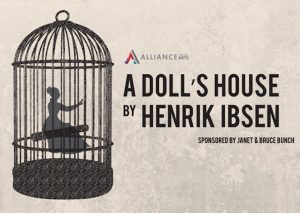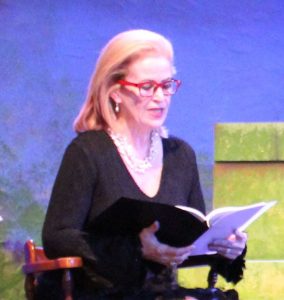Ibsen’s ‘Doll House’ more relevant than ever
 A woman cannot be herself in modern society with laws made by men and with prosecutors and judges who assess female conduct from a male standpoint. This comment did not evolve out of the “Me Too” or “Time’s Up” movements. It did not come from this year’s or last year’s women’s marches. It was penned by author Henrik Ibsen at the time he began writing A Doll’s House in September of 1878. Now, Theatre Conspiracy
A woman cannot be herself in modern society with laws made by men and with prosecutors and judges who assess female conduct from a male standpoint. This comment did not evolve out of the “Me Too” or “Time’s Up” movements. It did not come from this year’s or last year’s women’s marches. It was penned by author Henrik Ibsen at the time he began writing A Doll’s House in September of 1878. Now, Theatre Conspiracy  brings this prescient play to the Foulds Theatre stage beginning March 1.
brings this prescient play to the Foulds Theatre stage beginning March 1.
A Doll’s House is typically referred to as a tome about love gone awry. To those on the outside, Torvald and Nora Helmer seem to be living the dream. Happily married with three children and security, they appear to have it all. But as Ibsen begins to pull back the curtain on their relationship, it becomes manifest pretty quickly that the health and vitality of their nine-year marriage is predicated on Nora’s willingness to embrace the childlike role defined by her husband.
Torvald,  it turns out, views marriage as a sacred trust in which the man rules benevolently. “To lie in a family home,” he pontificates, “diseases it, contaminates it.” And so it is that Torvald’s feelings and concept of love are put to the test when Nora risks her reputation to save his life. Does he truly love Nora or is it the image of the ideal wife he has created in his own mind with which he is actually in love?
it turns out, views marriage as a sacred trust in which the man rules benevolently. “To lie in a family home,” he pontificates, “diseases it, contaminates it.” And so it is that Torvald’s feelings and concept of love are put to the test when Nora risks her reputation to save his life. Does he truly love Nora or is it the image of the ideal wife he has created in his own mind with which he is actually in love?
In spite of its age, A Doll’s House has come to be considered a contemporary feminist drama. However, Ibsen resisted that characterization. In fact, the playwright insisted that the theme of his play is “the need of every individual to find out the kind of person he or she  really is and to strive to become that person.” From that standpoint, A Doll’s House is not feminist, but humanist, which explains why it remains so relevant at a time when women are so stridently demanding that men relate to them as people rather than sexual beings, chattels and objects to be controlled and possessed by their husbands, boyfriends and fathers – and pushing back so vociferously when men fail in this regard.
really is and to strive to become that person.” From that standpoint, A Doll’s House is not feminist, but humanist, which explains why it remains so relevant at a time when women are so stridently demanding that men relate to them as people rather than sexual beings, chattels and objects to be controlled and possessed by their husbands, boyfriends and fathers – and pushing back so vociferously when men fail in this regard.
A play of this caliber demands a special director and actors. That is why Theatre Conspiracy has entrusted A Doll’s House to Anne Dodd (2nd photo) to direct. It has also assembled a gifted cast that includes professional Equity Actor Brendan Powers (3rd photo) as Torvald, the very talented Dena Galyean as Nora, and Patrick Day, Karen Goldberg, James Robinson, Eren Sisk and Paula Sisk in supporting roles.
Reserve your seats early as performances are sure to sell out.
February 15, 2018.
RELATED POSTS.
- Ibsen’s ‘Doll House’ more relevant than ever
- Brendan Powers plays Torvald Helmer in Henrik Ibsen’s ‘A Doll’s House’
- Dena Galyean plays Nora Helmer in Henrick Ibsen’s ‘A Doll’s House’
- Patrick Day plays Nils Krogstad in Theatre Conspiracy’s production of ‘A Doll’s House’
- Karen Goldberg plays Kristine Linde in ‘A Doll’s House’
- Eren Sisk is Helene in Theatre Conspiracy’s production of ‘A Doll’s House’
- The muse who inspired Ibsen to write ‘A Doll’s House’
- ‘A Doll’s House’ play dates, times and ticket info














 Tom Hall is both an amateur artist and aspiring novelist who writes art quest thrillers. He is in the final stages of completing his debut novel titled "Art Detective," a story that fictionalizes the discovery of the fabled billion-dollar Impressionist collection of Parisian art dealer Josse Bernheim-Jeune, thought by many to have perished during World War II when the collection's hiding place, Castle de Rastignac in southern France, was destroyed by the Wehrmacht in reprisal for attacks made by members of the Resistance operating in the area. A former tax attorney, Tom holds a bachelor's degree as well as both a juris doctorate and masters of laws in taxation from the University of Florida. Tom lives in Estero, Florida with his fiancee, Connie, and their four cats.
Tom Hall is both an amateur artist and aspiring novelist who writes art quest thrillers. He is in the final stages of completing his debut novel titled "Art Detective," a story that fictionalizes the discovery of the fabled billion-dollar Impressionist collection of Parisian art dealer Josse Bernheim-Jeune, thought by many to have perished during World War II when the collection's hiding place, Castle de Rastignac in southern France, was destroyed by the Wehrmacht in reprisal for attacks made by members of the Resistance operating in the area. A former tax attorney, Tom holds a bachelor's degree as well as both a juris doctorate and masters of laws in taxation from the University of Florida. Tom lives in Estero, Florida with his fiancee, Connie, and their four cats.